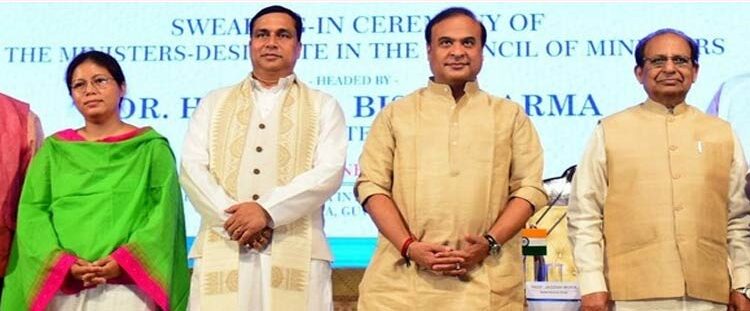Assam Chief Minister Himanta Biswa Sarma expanded his cabinet by inducting four new ministers, bringing the total to 18. This decision, announced on December 7, 2024, reflects the Chief Minister’s strategic efforts to ensure inclusive governance and maintain political equilibrium within the state. The expansion comes as the ruling Bharatiya Janata Party (BJP) and its allies prepare for the upcoming Lok Sabha elections, highlighting the importance of coalition politics and regional representation in India’s diverse political landscape.
The New Ministers and Their Representation
The four new ministers, drawn from different regions and communities, underscore Sarma’s commitment to balancing political and social aspirations. Their induction represents a thoughtful attempt to address regional demands and ensure equitable representation within the cabinet.
This move is particularly significant in Assam, a state characterized by its ethnic and cultural diversity. By including leaders from underrepresented groups and regions, Sarma has reinforced his administration’s focus on inclusivity and unity. This approach not only strengthens the BJP’s position in Assam but also sends a broader message about the importance of diversity in governance.
Timing and Political Implications
The cabinet expansion comes at a critical juncture as the BJP and its allies gear up for the 2024 general elections. With Assam playing a crucial role in the party’s electoral strategy, the new appointments aim to consolidate support across key constituencies. The inclusion of leaders from allied parties like the Asom Gana Parishad (AGP) and the United People’s Party Liberal (UPPL) also reflects the BJP’s efforts to nurture its coalition partnerships.
By addressing regional and ethnic aspirations through cabinet representation, Sarma’s administration seeks to mitigate potential dissent and maintain stability within the ruling alliance. This strategy is particularly important in Assam, where political equations can shift rapidly due to the state’s complex socio-political dynamics.
Governance and Development Goals
Beyond the immediate political benefits, the cabinet expansion is expected to enhance governance by bringing fresh perspectives and energy to the administration. The new ministers are likely to play key roles in advancing Sarma’s development agenda, which includes improving infrastructure, education, healthcare, and employment opportunities in the state.
With Assam facing challenges such as flood management, illegal immigration, and economic development, the expanded cabinet provides an opportunity to address these issues more effectively. The Chief Minister’s focus on delivering tangible results through his team reflects his commitment to ensuring that governance remains a priority amid political maneuvering.
Challenges Ahead
Despite the benefits of the cabinet expansion, challenges remain. Balancing the aspirations of different communities and regions within a limited cabinet size is a complex task. Ensuring coordination among ministers, particularly those from different political backgrounds, will be crucial to maintaining the effectiveness of the administration.
Additionally, opposition parties in Assam have criticized the expansion, alleging that it is driven more by political calculations than genuine governance needs. The Congress and other regional parties have accused the BJP-led government of focusing on electoral gains rather than addressing pressing issues like unemployment and rising prices. These criticisms highlight the challenges of navigating the intersection of politics and governance in a diverse state like Assam.
The cabinet expansion in Assam represents a strategic move by Chief Minister Himanta Biswa Sarma to strengthen his government’s political and administrative foundation. By prioritizing inclusivity and regional representation, the expansion reflects a thoughtful approach to balancing governance and coalition politics.
As Assam prepares for the 2024 general elections, the expanded cabinet will play a key role in shaping the state’s political and developmental trajectory. The success of this move will depend on the ability of the new ministers to deliver on the government’s promises and the administration’s capacity to maintain harmony among diverse interests.
In a state as dynamic as Assam, this expansion is both a political necessity and an opportunity to reinforce the principles of inclusive governance. If executed effectively, it could set a precedent for other states navigating similar challenges in India’s ever-evolving political landscape.


